WorldTour Week: Lappartient and the counter-reformation
'We need to use the Tour de France to lead all of cycling and to promote it'
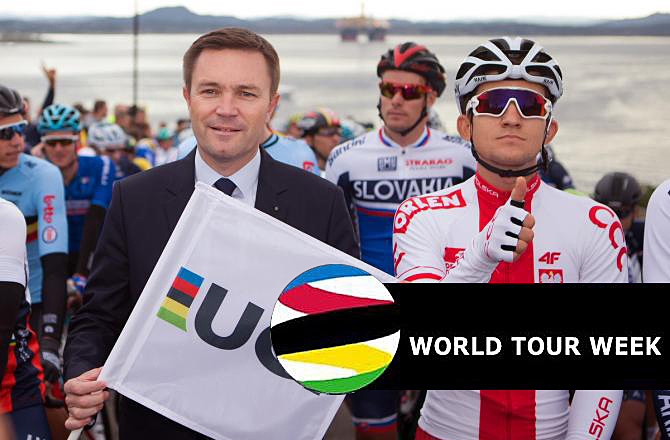
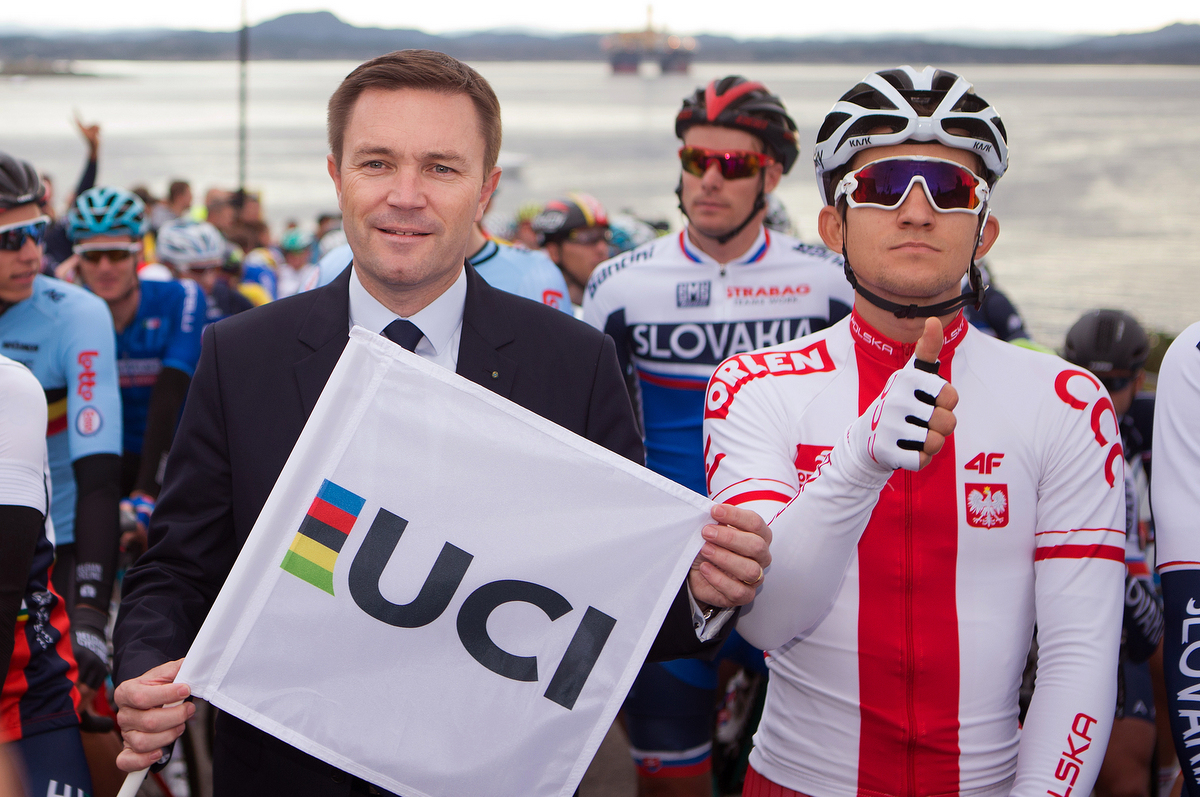
New UCI president, same old problems for the WorldTour. The season-long series that David Lappartient inherits from Brian Cookson is bloated, convoluted and failing to capture the imagination of the cycling watching public in any meaningful way, while teams and organisers are rarely on the same page. But what does the new man in the hot seat in Aigle propose to do about it?
For the duration of Cookson’s presidency, the WorldTour stakeholders – the UCI, the race organisers, the teams, and the riders – were locked in a seemingly interminable round of talks on reform, based around vague concepts of growth and stability. They came out the other end with a WorldTour inexplicably expanded to an unwieldy 37 events, but at a continuing impasse regarding pressing issues such as revenue sharing.
Into the breach steps Lappartient, who deposed Cookson at the UCI Congress in Bergen in September. The Frenchman’s cordial ties with ASO mean that the governing body’s relationship with the Tour de France should be less adversarial than at any point over the past 20 years – but can that help to build a commercially successful top flight structure? And do Lappartient’s pledges of increased stability extend to the Women’s WorldTour and its teams?
Cyclingnews spoke with the new incumbent on his vision for the WorldTour.
Cyclingnews: To your mind, what is the purpose of the WorldTour, and is it fit for that purpose in its current format?
David Lappartient: For me, the WorldTour – or the ProTour, as it was before – was implemented with the idea of having a worldwide sport, because cycling was more focused in Europe. I think it was a good idea to make cycling a more worldwide sport, and I think we now have some stronger teams and organisers, and the salary for riders is much better. So cycling is more important, more widespread and more worldwide than in the past, but I think that the economic model of our sport is still not very strong.
I also consider that we have too many races at the top level and it’s maybe difficult to understand for all the fans. This is something that we need to discuss. We need to really set up a new reform, and not just a discussion of small points. The idea for me is to work with the stakeholders, discuss the main issues for professional cycling, discuss how we can resolve them, and then to put it into practice with rules, calendars and everything. I think that sometimes we are approaching the problem in the wrong way because we discuss the calendar, for example, without asking about all of the other points. It’s a global picture that we need for this.
Get The Leadout Newsletter
The latest race content, interviews, features, reviews and expert buying guides, direct to your inbox!
What is quite difficult, finally, is that the different families are not united. And I think that if we want to really make cycling one of the strongest sports in the world, we need to have stakeholders who are able to share. They need to be able to share the same vision, at least, even if sometimes they will have different interests.
I want to put everybody around the table and I consider that the UCI is probably the only body able to do this, because the relationship between the stakeholders is not so strong for the moment. The UCI must take the lead on this.
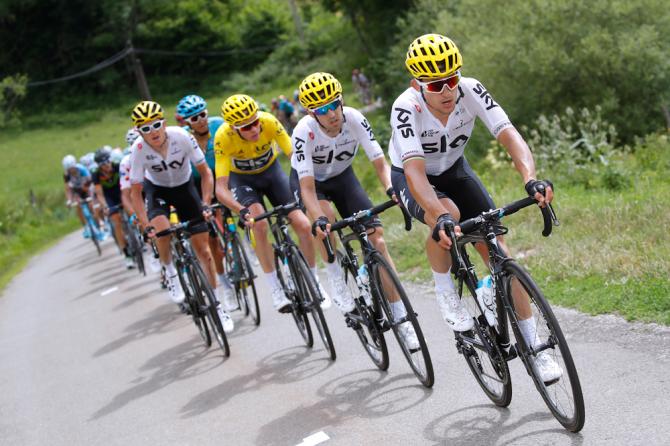
CN: You already said that the 2017 reforms did not meet their objectives, that they were too short-term in scope. What, then, is your long-term vision of what the WorldTour should be – not just before the end of your term as president, but in 2027, for instance?
DL: I was leading the Professional Cycling Council at the end of the reform, and by then, we didn’t know what the purpose of the reform was. We tried to find a lot of compromises and agreements, but I could feel that for this kind of reform, it might have been better to stay with the previous version of the WorldTour, so I think we missed something.
If we want to be a very strong sport, we must ensure that we will be on live TV, worldwide, for the main events, which currently is not the case for some important races on the calendar. For this, we need a very high level of TV production from all of the organisers, which at the moment is not at the same level for all races.
On this point, I continue to think that if each stakeholder tries to sell their own rights by themselves, it is not leading the group as a whole. I recognise that all these rights are the rights of the organisers, I have no problem with this, and I don’t ask that the UCI takes these rights. But I also consider that we need to see how we can work together to promote this worldwide vision of our sport. For example, if they [television stations] want to buy some races, maybe they would have to buy them as a package. That will be good for the sponsors and the stability of the teams.
If you look at the sponsors today in the WorldTour teams, you have very few worldwide sponsors. You have some national sponsors, even at WorldTour level. That means our sport is not worldwide. If you have the WorldTour on live TV in most of the big countries in the world, I’m sure that it will be more interesting for sponsors. This will bring some stability for the teams also, and this is what we need in cycling.
I also think we must reorganise the calendar. One part of the calendar is the heritage, the history, and one part is some new races. Everybody has tried to find their place within this calendar, but without a real framework for what we want to do at the top level. Perhaps it could be organised by Continent. The WorldTour could be in Oceania in January, in another part of the world in February and so on. After you have the Classics in Europe, the stage races in Europe, but we must maybe reorganise the calendar in Europe. When you have three WorldTour races in Europe at the same time the week after the Tour de France, I’m not sure that is the best way. In tennis, you wouldn’t have Wimbledon and Rolland Garros together, that’s impossible. And in cycling, when we have three WorldTour races at the same moment, it can be a problem.
CN: The teams have focused on the television rights of one race in particular, the Tour de France. What is your stance on this issue? Should ASO share its television revenue with the teams?
DL: If you look at the Tour de France, the Giro d’Italia and others, it [the revenue from television rights] is big compared with the rest of cycling, but it is low compared with other sports. So this is not the only solution, because if we take the profits of the Tour de France’s TV rights and divide it among the 22 participating teams, they will maybe have €1 million added to their budget, but some of them already have a budget of more than €30 million, so this is not the key solution at the moment. If the teams have more money, they will always try to have the best riders, and the salary of the riders will increase, but in the end, it will not solve the specific matter [of stability].
We must put the question on the table, but if the idea of each stakeholder is to take the rights of the others, then that’s why we are still here after four years, still fighting. If we are worldwide, then we will have greater interest from the sponsors and we can bring stability for the teams.
This is just an example, but in the future, why not set some prize money aside for the teams at the end of the WorldTour? It would come from part of the TV rights and could be distributed according to each team’s position in the final rankings, like the system in Ligue 1 in French football. That could be a way – not to directly share the TV rights themselves, but to take one part of the TV rights money.
You would still have prize money for the riders as you do now, but one part of the revenue that we can bring with this new model of cycling could go towards the teams. I want to help the teams, but if their only demand to the organisers is ‘give me your TV rights', then we will stay at the same position that we are in now. My idea is really to create value in cycling.
CN: In your manifesto, when you talk about the stakeholders, you list the CPA, the AIOCC, the AIGCP, but you don’t refer to the Velon group. What is your opinion of Velon? Do you plan to speak directly with the Velon group or only with the AIGCP?
I also said that, to my mind, these three families maybe need to reorganise their governance because they need to speak on behalf of all the stakeholders, which is sometimes not the case. We need to have a strong AIGCP, AIOCC and CPA to represent all of the stakeholders. Of course I have had some discussions with Velon. I met them during the UCI Gala, and I will meet them again. I respect the rights of the teams to discuss for commercial interest together, but Velon is speaking for the commercial interests of Velon members only, and they cannot speak for the commercial interests of all of the teams. Only AIGCP can do this. So for the reform, I will of course discuss with the AIGCP, the official body.
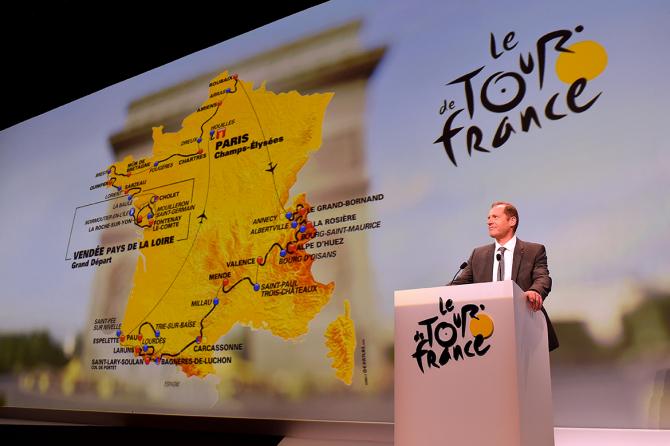
Grand Tour Plans
CN: You have discussed the idea of making the WorldTour “more attractive” as a package, a comment that can be interpreted in many different ways. Mauro Vegni has said that he is open to the idea of reducing Grand Tours to two weeks, but it would have to be applied to all three Grand Tours, not just to the Giro and the Vuelta. Do you want to make Grand Tours shorter?
DL: In the reform I want to implement, everything must be on the table. There is no subject that we cannot discuss. The problem is that we have more and more races on the calendar, and the three Grand Tours take up 69 days on the calendar. That’s a lot, so it’s quite difficult. The Tour de France is the Tour de France, I would say, but for the Giro d’Italia and the Vuelta a España, why not discuss with the organisers about this?
This is something that is on the table. I don’t want to force them in a specific direction, but maybe, maybe. That could be a way to have the top athletes at the start of the big races. You can see [with the current calendar] that you cannot win the Giro and the Tour de France today. Ok, Chris Froome won the Tour de France and the Vuelta, but I would say that was an exception.
Finally, just by reducing the duration of some Grand Tours – why not, so long as it’s with the agreement of the organisers – that could be a way to allow the top athletes to do two Grand Tours, or even all three. That could be good for the business of these races. This is something I want to discuss with the organisers, but I don’t want to force them in a direction. I don’t want to affect their rights.
CN: Just to be clear, you believe that the Tour de France has to remain at three weeks, no matter what?
We need to use the Tour de France to lead all of cycling and to promote it. The passion of cycling delivered by the Tour de France can be useful to bring in more fans around the world, so I think it would be a big mistake to lose one week of exposure for cycling. A lot of sports around the world are trying to have a worldwide event. We already have this in cycling so we must use this to develop all of our sport, so that’s why I don’t think we can reduce the Tour. I don’t say this as a French guy; I just say this as the president of the UCI looking at the opportunities that the Tour de France brings to our sport.
CN: We’ve recently had the first Tour of Guangxi in China, and much like the Tour of Beijing before it, it doesn’t seem to have excited the public, either in China or around the world. It wasn’t even live on television. Yet while events like this are elevated to WorldTour level too quickly, more established events in Europe – a Classic like Paris-Tours, for instance – have been pushed to the margins because they are outside the WorldTour. Do you think the UCI – and the WorldTour – are striking the correct balance between globalisation and ensuring cycling remains popular and relevant in its traditional heartlands?
DL: When we have new races arriving in new countries and we have the same calendar in Europe, it’s true that it can affect the level of participation in these historical races in Europe, but on the other hand we also need to be worldwide. I was in China and the feeling of the riders was different. In the past, they were sort of punished when they rode the Tour of Beijing in the past, but they said the Tour of Guangxi was different, it was very well organised.
I think this race can find a strong place on the calendar. It’s a start. This race will continue to grow and it can be useful. If the Chinese population is now watching cycling races, that will be good, because that means they will be educated about cycling and then there will be an interest, to buy TV rights and sponsor some teams, and this will be good for the development of cycling.
But I agree that in principle, the Tour of Guangxi is an exception. Normally you have to show that you are able to be at the WorldTour before joining the WorldTour. We expanded the WorldTour very quickly and that probably is one of the problems that we have today.
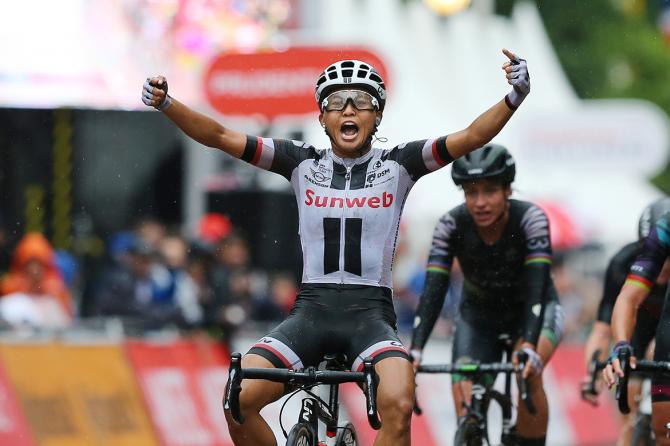
The future of women's cycling
CN: You have said that you want to work to ensure the viability of women’s cycling teams. But as things stand, the UCI cannot even guarantee the viability of teams in the most lucrative sector of the sport, the men’s WorldTour… In practical terms, how are you actually going to provide stability for women’s teams? Right now, they don’t even have a minimum wage, and we hear of riders all but competing for free in the Women’s WorldTour…
DL: I think there are two main, difficult problems for women’s cycling to overcome in order to have more stability for the teams. First of all, it is difficult to find women’s cycling on TV, except perhaps in the country in which the race is taking place. In order to have a sort of stability, to have salaries to be paid, for the women riders to have a better situation, you need sponsors, and to bring in these sponsors, you need TV, so that’s probably one of the problems we have.
The other problem we have, I think, is that we don’t have a strong stage race like the Tour de France for the men. We don’t have the equivalent for the women. If the public doesn’t see women’s cycling on TV and if you don’t have a very strong event, then it’s more difficult to promote the sport and give it a sense of stability. I said during the campaign that the UCI is doing a good job on women’s cycling. We are on the good way, but we are still far away from a real, stable system.
CN: There is already the Giro Donne, which has a history and real prestige, but it’s clear, as you said, that a women’s Tour de France is missing from the calendar. There is La Course, which is better than nothing, but only barely. Will you lobby ASO to re-launch the Tour Féminin?
DL: I think it’s good to have La Course by Le Tour, and it’s part of the global strategy. I will discuss this with ASO. I think they are the number one organiser in the world and I think they can do more than this for women’s cycling. They are doing more than in the past, they organise Flèche Wallonne and other women’s race at the top level. That’s good, but I want to continue talking with them about how we can continue to build the sport with them. They have the power to help and assist the organisers, teams and the UCI to promote women’s cycling. We need them. I would say this is a good start, but they need to continue to do more.
CN: It’s disappointing that only a handful of WorldTour teams have ever seen fit to incorporate a women’s team into the same structure, but do you think it would be more beneficial – or at least more feasible – if every WorldTour organiser had to organise a women’s race in conjunction with their men’s races? This has been achieved quite successfully by Flanders Classics, for instance.
DL: Yes, I would be happy if some organisers organised more women’s races, but I don’t think it’s good to do this by force. It’s better if they feel it’s also better for them to organise these kinds of races. We also already have some specific women’s races on the calendar, and they are important. If we then have all of the men’s WorldTour races adding women’s races too, that could be a problem for the organisers who only organise women’s races, because the calendar would be very heavy.
You have to recognise that the calendar in the Women’s WorldTour is already very widespread. The teams don’t have the same resources as the men’s teams, they don’t have the same revenue or the same number of riders, so I don’t see how they could ride all those [additional] races. We just have to find a good balance. Maybe we started too fast. It could be nice to have 10 strong, viable teams as a first step, where all of the riders are paid on the team.

Barry Ryan was Head of Features at Cyclingnews. He has covered professional cycling since 2010, reporting from the Tour de France, Giro d’Italia and events from Argentina to Japan. His writing has appeared in The Independent, Procycling and Cycling Plus. He is the author of The Ascent: Sean Kelly, Stephen Roche and the Rise of Irish Cycling’s Golden Generation, published by Gill Books.